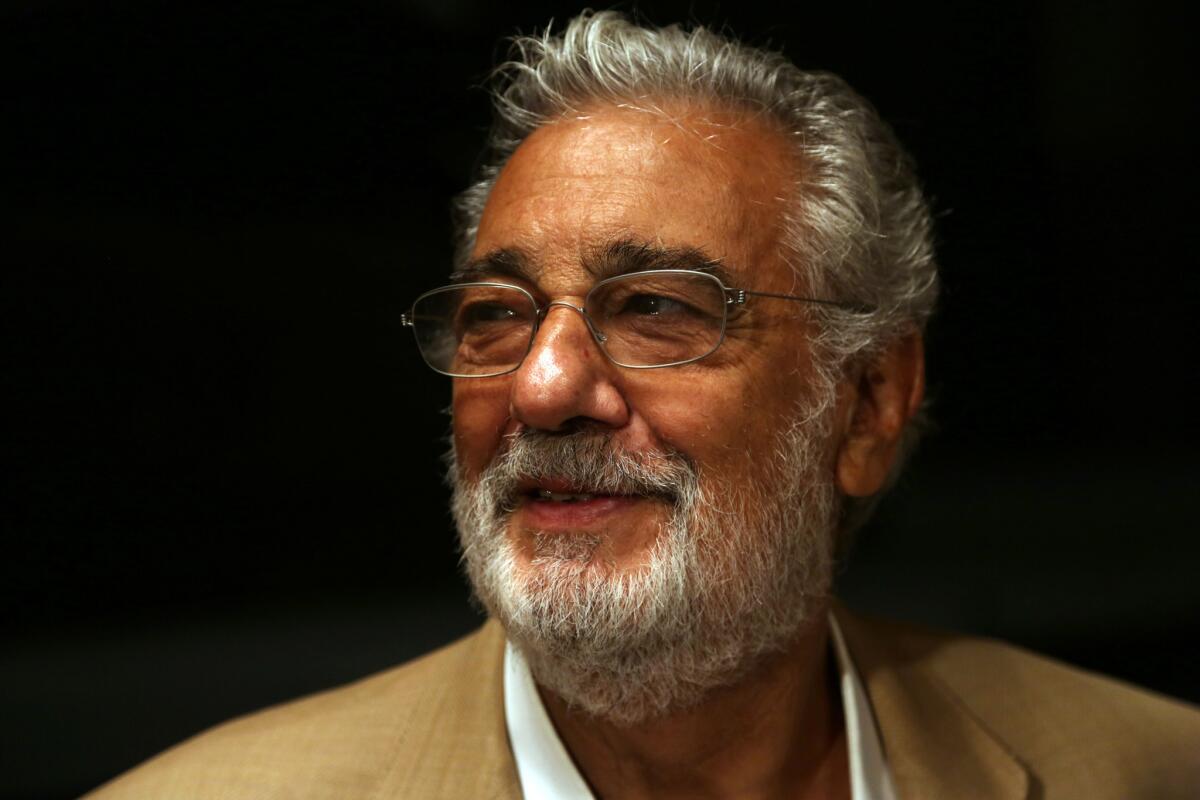Calendar Feedback Sun., Oct. 13, 2019

- Share via
Readers react to Domingo’s departure
I wonder how #MeToo activists and victims feel about Mark Swed’s extended apologia for Plácido Domingo [“As Domingo exits his legacy lingers,” Oct. 3]: “[I]n the end, we may very well have to conclude that he’s human, and that maybe he couldn’t have done all the great things he did without also having done what he shouldn’t have, and hurting people along the way.” Is that what was said about Harvey Weinstein? Kevin Spacey? Garrison Keillor?
Mitch Paradise
Los Angeles
::
Thank you, Mark Swed, for the beautiful tribute to Plácido Domingo while withholding judgment. It is a sad time but we have wonderful memories.
Alison Riggs
Campbell
20 best Asian American films
Re: “The Asian American canon: What are the 20 best films by and about this diverse population in the last 20 years? We asked experts,” Oct. 6: Brian Hu’s list of the 20 best Asian American films of the last 20 years was an eye-opener. As a life-long movie fan, who prides himself on paying attention to obscure foreign-language and cross-cultural cinema, I was stunned at how few of the movies listed I had even heard of. While we can all rejoice in having long ago transcended the likes of “Charlie Chan,” we obviously have a ways to go. Onward!
David Macaray
Rowland Heights
::
In the spirit of Brian Hu’s significant article, “The 20 Best Asian American Films of the Last 20 Years,” about overdue canons and begetting more of them, the addition of Joan Chen is essential. As an actress she has worked with many of the filmmakers cited in your survey, though Chen originally emigrated to the U.S. to study directing at Cal State Northridge. Her debut film, “Xiu Xiu: The Sent Down Girl,” earned many festival honors and critical recognition around the world, including the 2000 Independent Spirit Award for Best First Feature.
Nancy Nigrosh
Los Angeles
The price of admission
Christopher Knight’s comments on the historical background to the Huntington exhibit “Nineteen Nineteen” are on the mark [“Review: ‘Nineteen Nineteen’ isn’t what it used to be,” Oct 9]. I also liked his remark that until 1969 the endowment followed the explicit intent of the donors that the public be admitted free. The cost of about $25 today prohibits poor families’ attendance. An outside official audit of the budget is needed.
Robert Baker
Pacific Palisades
::
Christopher Knight needs to get his facts straight. Unlike the Getty, Hammer or Broad, the Huntington is situated on 207 acres, with 17 gardens, three art galleries, a botanical conservatory and a library with 10,000 items. Unlike the Getty, Hammer or Broad, the Huntington is a historical treasure. Unlike the Getty, Hammer or Broad, which charge $15 to $20 for parking, the parking at the Huntington is free. The Huntington has free admission on the first Thursday of each month, free school programs and provides free buses to schools that cannot afford one.
Susan Harbach
Sherman Oaks
Readers rally around a film critic
Sunday’s letter writers complained about film critic Justin Chang’s erudition and knowledge of film history, suggesting that somehow they made the reviewer self-centered [Letters, Oct. 6]. These traits, accompanied by his thoughtful analysis, articulate writing and obvious delight in good cinema, are exactly why I look forward to Justin’s reviews. Please leave Justin alone, we need more like him.
Gary Williams
South Pasadena
::
The function of a film critic may be open to debate but I am getting very cranky reading letters criticizing Justin Chang’s style and erudition. I am buoyed by his enthusiasm for film every time I read one of his reviews. I have enjoyed so many movies I never would have seen had I not read his assessment. What I particularly like is that he explains how he arrives at his conclusions — he may refer to movies I have not seen but his reasoning is clear.
Rottentomatoes.com offers a numerical assessment for people who prefer their movie reviews short and simple.
Nancy Ramseyer
Burbank
::
Justin Chang’s review of “Joker” [“Joaquin Phoenix puts on quite a show in ‘Joker.’ And the portrait of madness is both bleak and glib,” Oct. 1] is an example of excellence in film criticism. He paints a picture of the film without revealing third-act spoilers, he writes of the cultural climate the film is being released into, and he presents a firm grasp of the cinematic history that influenced the filmmakers. Chang is an outstanding critic. Keep up the good work.
Abel Horwitz
Los Angeles
::
I often disagree with film critic Justin Chang’s assessments of current movies I’ve also seen, but I have to say his review of “Joker” is a gem of creative writing within the genre of film criticism. His intricate, complex, precise, visually and emotionally charged words sound great as presented in his dive into the disturbing world of the film at hand. The review is overly long — more appropriate for a feature piece than a film critique — but absorbing in its descriptions and analysis with such powerful use of language to capture the intensity and entanglements of the film itself.
Still, I wouldn’t assume his take on the film is one I will end up agreeing with after I’ve seen the movie. His final comparison with “Taxi Driver” — one of the most overrated and severely flawed films that many critics continue to cite as a masterpiece — tells me I just can’t trust the final judgment of Chang regarding whether a film is good, bad or mediocre.
T.R. Jahns
Hemet
An opera star gone too soon
Thank you, Mark Swed, for your moving eulogy for one of the most magnificent people to grace our world [“Jessye Norman used her voice wisely,” Oct. 4]. She was here for too short a time.
Susan Greenberg
Los Angeles
Swed remembers Bernheimer
Thank you, Mark Swed. Your remembrance of Martin Bernheimer was stunning [“A critic who transformed criticism: Martin Bernheimer was a law unto himself for 30 years as The Times’ classical writer,” Oct. 2].
Your summary of the history and impact of Martin’s work at the L.A. Times was immensely interesting. But even more significant to me was how you also interwove your own personal life into the narrative. As a result, I have a much clearer image of what makes you tick. Thank you for your candid and refreshingly intimate reflections.
Denis Moreen
Palm Springs
::
I write in response to Mark Swed’s mean-spirited obituary of Martin Bernheimer.
I took a course in music criticism from Mr. Bernheimer in 1981 at USC. The class turned out to be the highest quality instruction I received in the School of Music during my years there.
Mr. Bernheimer never, not once, commented on the appearance of the USC women taking the course, the women on the USC campus in general, or the women we discussed as performing artists in the coursework. He was never inappropriate and he treated the students with respect, dignity and kindness. This made Bernheimer a stand-out at a time when it was customary and accepted that men professors and adjunct faculty routinely tried to “date” female students, showed up at student parties off-campus, commented during class and outside of class on the appearance and apparel of female students, and dangled the prospects of employment before starving and hopeful students trying to get a toehold as professional musicians.
Christina Cole
Chandler, Ariz.
Don’t forget Lt. Uhura
I was sorry to read of the passing of the beautiful and talented Diahann Carroll, the star of her own groundbreaking show in 1968 [“Diahann Carroll 1935-2019: Groundbreaking actor of TV, films and stage,” Nardine Saad, Oct. 4]. But to credit her as the first African American woman to be cast in a non-domestic role would be a surprise to the equally beautiful and talented Nichelle Nichols, who had been co-starring as Lt. Uhura for two full seasons on “Star Trek” when “Julia” premiered in 1968. As head of communications on the Starship Enterprise, Lt. Uhura was not in charge, but she was clearly not a domestic servant either.
Lynn Swanson
Anaheim Hills
Editor’s note: The reader is correct. The story should have made it clear that Diahann Carroll was the first African American woman to be cast as a lead actress in her own series. Nichols’ groundbreaking role was as a supporting character in “Star Trek.”
Rock or not rock?
John Sykes, new chairman of the Rock and Roll Hall of Fame, stated in your article [“The Sunday Conversation: Ready to rock the hall,” Randy Lewis, Oct. 6] ] that he recognizes that the Rock and Roll Hall of Fame is no longer about a single genre of music. I say that it’s now time to change the name to the Music Hall of Fame. Rock and Roll is rock and roll and not any other genre of music.
Steve Shaevel
Woodland Hills
::
The Rock and Roll Hall of Fame’s new chairman, John Sykes, thinks Notorious B.I.G. has a “good shot” at getting inducted? Maybe someone should inform Sykes why Biggie will be unable to attend the ceremony, so he may choose his words more thoughtfully in the future.
Jim Cushinery
Los Angeles
In the matter of President Trump
The next time the L.A. Times editorial staff needs a journalist to write an excoriating anti-Trump article (“Trump mojo takes a steep dive,” Oct. 4), I would recommend that they place television critic Lorraine Ali at the bottom of a very long list. Notwithstanding the Times’ political leaning, the placement of her polemic against the president in the Calendar section of the paper seems inappropriate.
William Preston, M.D.
Laguna Beach
Poetry on stage
Regarding theater critic Charles McNulty’s review “‘A Play Is a Poem’ is such a pity” [Sept. 24]: It seems to this Mark Taper subscriber that when the ovens and showers of the Nazi regime are lampooned, as they are in “A Play Is a Poem,” it feeds into the rhetoric of the Holocaust deniers.
One wonders if the writer, Ethan Coen, or artistic director, Michael Ritchie, considered that this final skit of the evening might be offensive to theatergoers? Did they consider that those attending could very well have lost not-too-distant relatives in the mentioned Auschwitz, Sobibor or other death camps? (And, no, this cannot be equated with the goose-stepping silliness of “The Producers” that made Hitler the butt of the joke, not concentration camps.)
I’ve seen placards at the entrance to auditoriums stating that smoking and gunfire are used during a play.
Perhaps, in this case, the Taper would be kind (judicious) to add, “At this performance, the Holocaust is ridiculed.”
Michael Levin
Long Beach
More to Read
The biggest entertainment stories
Get our big stories about Hollywood, film, television, music, arts, culture and more right in your inbox as soon as they publish.
You may occasionally receive promotional content from the Los Angeles Times.











